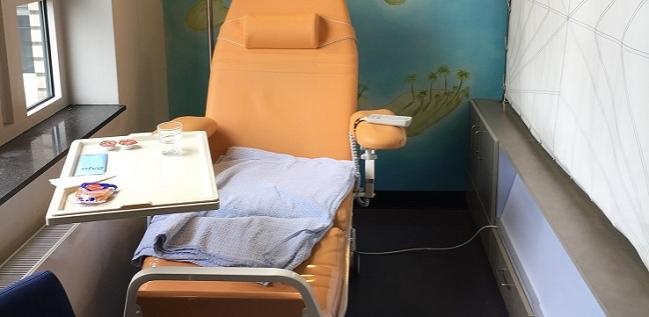Same-Day Discharge After Transradial PCI Safe, Feasible, With Significant Cost Savings
Data from a single high-volume US center suggests same-day discharge after transradial PCI could become the norm in uncomplicated, elective cases.

WASHINGTON, DC—A high-volume center accessing the coronary arteries via the radial artery safely discharged PCI patients home the same-day and significantly lowered the costs of the procedure when compared with an overnight stay, new research shows.
Presenting data at CRT 2017 in Washington, DC, William Rollefson, MD (Arkansas Heart Hospital, Little Rock) reported equivalent 30-day clinical outcomes among transradial PCI patients sent home the day of the procedure and patients who stayed overnight.
“When we looked at the cumulative costs in US dollars of transradial same-day discharge versus an overnight stay, the total cost in the same-day arm was $3,346,” said Rollefson. “On average, the cost of the overnight stay was $4,682, which was an initial cost savings of $1,336, and this was slightly increased at 30-day follow-up.”
Previous studies have shown patients can be safely discharged the same day after an uncomplicated PCI. For example, in a meta-analysis published in 2013, Olivier Bertrand, MD (Laval University, Quebec, Canada) and colleagues analyzed data from randomized and observational studies and showed similar rates of complications, major adverse cardiac events, and rehospitalizations between same-day discharge and overnight PCI patients.
Rollefson highlighted data from the American College of Cardiology National Cardiovascular Database Registry (NCDR) showing that just 1.25% of PCI patients were discharged the same day. Last week, in a study published highlighting the financial savings from same-day transradial discharge, the data showed slightly more than 5% of eligible PCI patients between 2009 and 2012 went home the same day.
In Rollefson’s analysis, dubbed RASADDA-PCI, the researchers included 245 elective PCI patients who were discharged the same day and 245 patients who were kept overnight. In the registry study, patients had single or multivessel coronary disease and all had an indication for transradial PCI. Patients with diabetes were excluded from the analysis and baseline and procedural characteristics were well matched.
At 30 days, investigators observed no significant differences in cardiovascular complications, rehospitalization, reintervention, MI, stroke, or death between patients discharged the same day and those who spent a night in the hospital.
“We basically use the time that the procedure is completed and if there had been any problems in the cath lab,” said Rollefson, referring to the same-day decision-making process at his hospital. “There are some patients who are obviously going to stay overnight, such as patients with renal insufficiency and [those requiring] dialysis, but really it’s at the discretion of the operator.”
On average, patients were held in the hospital 4 to 6 hours before discharge home the same day, he added.
“Old News”
To TCTMD, Haim Danenberg, MD (Hadassah Medical Center, Jerusalem, Israel) said the US lags behind when it comes to discharging patients home the same day after PCI. “It’s old news in Europe,” said Haim. “I think the main issue here in the US is one of reimbursement, which makes physicians somewhat reluctant. But as for patient safety, it’s already a done deal. It can be done in a very safe manner and costs are reduced.”
Hans Bonnier, MD (University Hospital, Brussels, Belgium) agreed. “In Holland, every patient goes home the same day,” he said. “It doesn’t matter if it’s done via the arm or the leg. It doesn’t make any difference.”
At their center, Rollefson said they perform more than 80% of PCI cases transradially. Prior to 2013, they discharged just one in 20 patients home the same day, but after the introduction of the Centers for Medicare and Medicaid Services’ “two midnight rule,” in which patients are only classified as an inpatient if they spend two nights in hospital, more than 75% of patients now go home the same day (same-day and single-night-stay patients are classified as outpatients and receive the reimbursement).
Asked if a randomized trial is needed to move same-day discharge forward in the US, Rollefson said he imagined randomization would be difficult in patients undergoing simple, uncomplicated PCI. “It’s hard to make the argument that that patient needs to be kept overnight,” he said.
Ron Waksman, MD (MedStar Heart and Vascular Institute, Washington, DC), who chaired the late-breaking trials session, said there is likely no need for a randomized, controlled study. “It goes back to personalized medicine,” he said. The present series suggests “it can be done, it’s safe, and it’s up to us to determine in whom we feel comfortable doing this.”
Photo Credit: Jordan Safirstein.
Michael O’Riordan is the Managing Editor for TCTMD. He completed his undergraduate degrees at Queen’s University in Kingston, ON, and…
Read Full BioSources
Rollefson W. Feasibility and clinical importance of same versus next-day discharge after elective transradial percutaneous coronary intervention: the RASADDA-PCI trial. CRT 2017, Washington, DC, February 21, 2017.
Disclosures
- RASADDA-PCI was performed with support from Terumo.
- Rollefson reports consulting for Terumo Medical, Medtronic, and Endologix.
- Danenberg reports servings as an advisor to Cardiosert and Valcare, serving as a clinical proctor for and receiving grant support from Medtronic, and consulting for Simbionix
- Bonnier reports no conflicts of interest.
- Waksman reports consulting for Abbott, Biosensors International, Biotronik, and Boston Scientific and serving on the board/advisory panel/speaker’s bureau for Amgen.


Comments